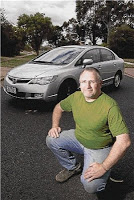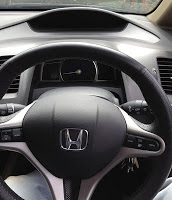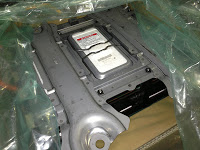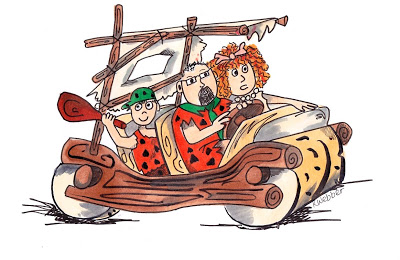In a few weeks, our car is seven years old. Happy Birthday car!
However folks, it is not your ordinary internal combustion engine car, but a hybrid/electric car. Just one of those crazy, unthought through decisions one made in the very early years of greening.
If you have read the free eBook, “The Greening of Gavin“, you would no doubt have read about how I came to lease this car only a week or two after my green epiphany. It was a huge statement of sorts that I was serious about greening my lifestyle, however in hindsight, I probably would not have rushed into such a purchase, and just lowered car usage instead.
So, now that I own the Honda Civic Hybrid (2006), and have driven it for just shy of seven years, what is the verdict? How has it performed? Did anything major go wrong with it? Would I buy another hybrid?
Performance
On average I get about 5.2 litres per 100km, just under 800km to a 40 litre tank refill. The petrol tank holds 50 litres, but I have never chanced my luck, and always filled it as soon as the warning light appeared on the dash. So the fuel economy is very good. That means that technically, for just $60 of fuel (current price $1.60 per litre), I could drive from Melton to Adelaide, or to Sydney if I chose to. With a full carload, it would be cheaper than flying and take around 7 hours. A lot less greenhouse gas emissions as well, even compared to a normal family sedan or SUV. I also offset the small amount of GHG emissions via GreenFleet. It make a whole lot of sense to me.
Well, I would love to say that nothing went wrong, but I can’t, because it did. The Hybrid Battery failed. However this only occurred during the last two weeks, and thankfully was covered by a warranty. My local Honda dealership diagnosed the fault, and ordered in the new Integrated Motor Assist (IMA) battery pack at no cost to me.
It doesn’t look like much, just a metal box with lots of Nickel Metal Hydrate cells packed into it. The dealership told me that it would be sent back to Japan to be recycled into a new battery pack. At least it wasn’t going to landfill.
 Fortunately, the hybrid battery has been the only fault for the entire 7 years with just over 98,500 km travelled. The battery fault did not put a dampener on my ownership, and it was picked up early as I ensure the car is serviced as per the plan.
Fortunately, the hybrid battery has been the only fault for the entire 7 years with just over 98,500 km travelled. The battery fault did not put a dampener on my ownership, and it was picked up early as I ensure the car is serviced as per the plan.
However, I would highly recommend that if you do purchase a hybrid or even an electric car for that matter, ensure you fully understand the warranty period for the battery bank to understand possible replacement costs if you intend on owning the vehicle for a long time.
Would I buy another hybrid?
Maybe, as hybrid technology has advanced in the seven years since I bought mine. On the other hand, probably not. If forced to purchase a replacement for the one I already own, I would probably buy an electric car if it was not too expensive (but they currently are). I want to break reliance on fossil fuels with my next purchase. I could charge it very cheaply from my solar PV system, but would have to add a few more panels to balance the costs.
Alternatively, and it depends on Kim’s health, I would love to get rid of reliance on cars altogether. Yes, no car ownership would be my ultimate dream. Maybe if I had a Flintstone car, we would still get around!
Better still, Ben and I are still riding our bikes, so with more practice, and a trailer, it could be a viable alternative.
Anyway, that is my experience of owning a hybrid car. With cheap fuel bills, and low emissions, what is not to like about a hybrid (besides the battery fault)?
What do you think? Would you buy or have already bought this type of car? What is your experience?





Im commenting only so you know im here, reading, gathering & processing information but i do not deserve to be part of this conversation. What i drive would make your toes curl so i had better just shut up! I do know that when my beast need replacing that i will be making a much greener choice. (Am i forgiven?)
Hi Lynda, Just remember that acknowledgement of an issue is the first step in making changes in the right direction.
There is nothing to forgive, my friend.
Gav x
My workplace has hybrids which I just love to drive and book them every time. We changed our largish sedan for a little car which is very economical on fuel. I don’t miss the bigger car. Now we fill up every second week where before it was weekly. We have more than halved fuel costs and thereby emissions. I would love an electric car but only if brown coal wasn’t the source for the electricity.
Hi Penny, I totally agree with your concerns about the energy source for an electric car. If powered by brown coal, there is no point, but solar and wind would lower considerably. If the car owner changed to a GreenPower scheme, then that would work as well in my humble opinion.
Gav x
I work for the gov’t and the best we have got is diesel Holden Cruzes – it’s a small portion of the overall fleet. On principle, to support the local car industry, this is what they have chosen.
Thankfully a lot of people use public transport, their own bicycles, or taxis to get to meetings, etc.
I think you demonstrate the longevity of a quality car here. Many people that I have spoken to about electric or hybrid cars complain about the perceived repair costs. Repair costs don’t exist if you don’t need to repair your car or have a decent warranty. And good on you for not changing your car with the trends like so many do. Not that you would do that. 🙂
Would I consider a hybrid (or electric car)? Nope. Not at all. I have never gotten around to (read: wanted to) get my drivers licences and have driven a car once – when I was 15, down my dads long driveway in the bush. I have always lived within public transport, cycling or walking distance of where I need to be the majority of the time. People ask me “But how do you get to X?” I don’t go to X. I go to places that are within my grasp. If I want to holiday in South Australian countryside I choose a destination I can catch a coach to – not somewhere I can’t.
And so I face the biggest “movement” challenge in my life. I am looking for land in rural Victoria on which to build a tiny house. My trusty bicycle will remain my primary mode of transport. How do I address this? Well, by making mindful decisions from the outset. The land I buy needs to be within a reasonable distance of services I need to access on a regular basis (one block that I am inspecting in a week has a general store, pub and post office within 5 minutes cycle and is on a well-served regional bus route) and be on or near a reliable public transport route (I am happy with one that has services at least 3 times a week). Other than that, and I see this coming in handy during the build, I wish to seek the assistance of people in the community – something people are generally to scared to ask for. If I can be so bold to share a blog post I wrote on the subject. It’s called “Rural Living Without a Drivers Licence”: http://desirableworld.wordpress.com/2013/08/05/rural-living-without-a-drivers-licence/
We installed a 4.5 kva stand alone solar system early this year, and very quickly found that we just couldn’t use a fraction of it. So, after a lot of research, we bought a second hand Prius and a plug-in kit for it. We plug it in to charge up overnight, and with our household consumption, it drops the batteries to 80% which is within the range of OK. If the next day is fine (even in winter), the batteries reach 100% again by the middle of the day. It means we are getting fuel economy of around 3 litres per 100 km, even living at the end of a very steep dirt road. Prius’s are the choice for many taxis because they are so long-lived and reliable. A pure electric would be nice but they are so expensive, and there are so few places you can charge them yet, and we need to travel bigger distances than possible on one charge. So far I’m loving the Prius (we jokingly call it our Pious).
That’s a very permaculture, Linda. You obtained a yield and now you’re sharing the surplus – kind of. You have great commitment – I am sure a lot of people would have gone “Excellent, we have enough energy left over to buy that big TV we wanted!” Actually, I am not sure many off-grid people are like that at all.
I have crunched the numbers and will be installing a 720W system (4 180Ws). It’s more than enough for me and I can build it for around $2,000. I spoke to a guy at work about my desire to go off-grid and it turns out on the side he runs a business installing off-grid solar. He said I would be looking at about $25,000.I nearly fell over. Sure, it probably would cost that much if I wanted a system that would allow me to live a careless life where electricity usage doesn’t fall into the scope of things to be concerned about.
At this stage I don’t think there is a hybrid or electric car that suits our needs. With 3 children and our animals and rural lifestyle we need a fairly large car and one that can haul a trailer loaded with wood harvested from the forest. Our old Renault was up to the task with small trailer loads and dry easy access roads but not all the wood is in such locations so we’ve bought a Turbo Diesel Delica. Our green qualifications here are more about what we can do with the car and it being second hand rather than the actual car. Am I happy we had to get a bigger car? Nope. Am I happy that we have a car at all? Not really but the reality is that at this time in our life we do truly need a car and this was the most suited to our lifestyle. One day in the hopefully not too distant future I hope that having a a car would be of little use to us, but at this time…